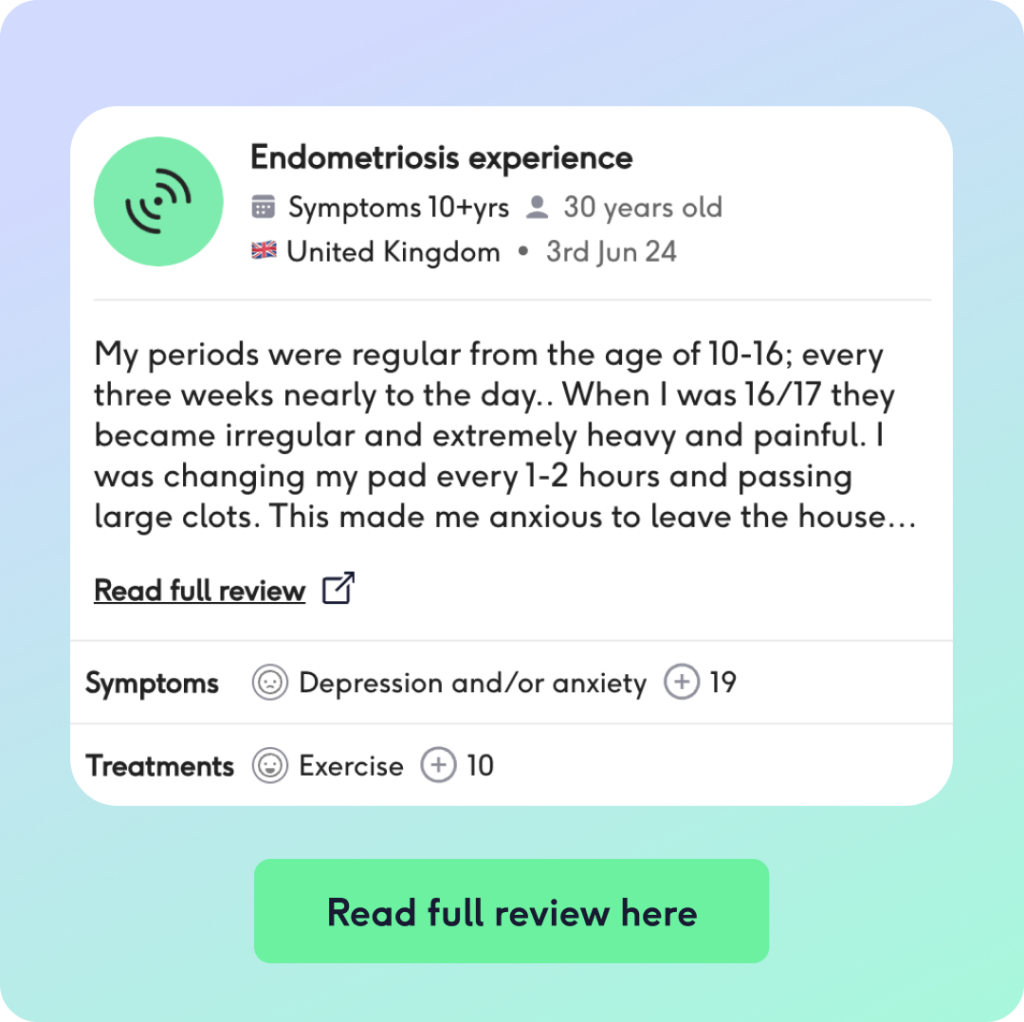
Mythbusting: are painful periods a sign of good fertility?
In this article
What's the lowdown?
Painful periods themselves do not have any bearing on your fertility. That is a myth!
If you struggle with painful periods, it could be because you have an underlying gynaecological problem like endometriosis
See your doctor if your painful periods are affecting your life
Underlying gynaecological problems that cause painful periods may affect your fertility
It can take up to a year to get pregnant – and this is still normal
Are painful periods a sign of good fertility?
You’ve probably heard at some point that period pain is normal? Or maybe even period pain is a good thing as it means you are fertile?
Well, whoever told you that is not your friend and just dismissing your pain. Yes, period cramping can be part and parcel of being a woman, but painful periods affecting your quality of life are not. Painful periods can, in fact, be a sign of an underlying problem which could affect your fertility.
What causes painful periods?
Painful periods are called dysmenorrhea in the medical world. There are 2 types of dysmenorrhoea1:
- Primary dysmenorrhoea: Manageable pain and cramping starting on the first day of your period, lessening and disappearing by day 3
- Secondary dysmenorrhoea: Pain linked to a condition affecting the female reproductive system that worsens over your period, lasting longer than normal cramping. Usually, the pain starts a day or two before your period arrives
The uterus (womb) needs to contract during our period to get rid of our endometrial lining (womb lining). Our body releases natural chemicals called prostaglandins (do not confuse this for progesterone!). These prostaglandins trigger the uterine muscle to contract. In some people, these prostaglandin levels can be high causing severe excruciating pain2.
Are painful periods normal?
Well, it is definitely hard to set a level of pain as normal and abnormal. We all feel and experience pain differently. If your period pain affects your quality of life negatively, such as preventing you from working, exercising or even leaving the sofa, then that is not normal. No one deserves to lose a few days each month to their period!
What is causing my painful periods?
If you have primary dysmenorrhoea, there is no underlying cause for your painful periods. However, secondary dysmennorhoea can have several causes.
Have you heard of endometriosis? The condition affects 10% of women and those assigned females at birth (AFABs), but sadly many live with the symptoms for 8-10 years before getting a formal diagnosis as an answer for their pain.
Endometriosis is one condition that can cause painful periods3. Adenomyosis, fibroids and pelvic inflammatory disease (often caused by STIs) are other causes. The copper coil (IUD) also has potential side effects of worsened period pain and heavy periods.
If you have painful periods, whatever the reason, you do not have to suffer in silence. There are many pain relief options like mefenamic acid or contraception that can restore a normal balance to your life. We cover everything to help relieve your pain separately.
Wonder what endometriosis feels like? Hear from some of our community.
So, what does this mean for my fertility?
The burning question! How can you know if you are fertile? While some signs can point to good fertility, it is important to remember that around a third of fertility issues are male-related and also a third of cases of infertility are unknown4,5,6. So please do not put too much pressure on yourself, be kind and gentle to the body that has carried you every step of life. If you are suffering with painful periods that are affecting your day to day life, please see your doctor. These can be an indication of an underlying condition which may affect your ability to get pregnant.
What are the signs of good fertility?
Signs of fertility:
- Regular periods: Periods are a sign of ovulation, so regular periods can point towards regular ovulation. So this can provide you with a schedule on how to time your sex with ovulation
- Cervical mucus changes: Tracking your cervical mucus can tell you a lot more about your fertility. Yes, that fluid we find in our vagina changes as your cycle changes. So an egg-white sticky consistency usually means you have ovulated as your body is providing a mucus environment that is ideal for the sperm to race in7. However, this is not a definite sign as some women may ovulate without experiencing the cervical mucus changes and others can have the mucus, but not release an egg.
- Gynaecological medical history: Having no gynaecological conditions means there is less affecting your chances of pregnancy. Endometriosis, PCOS, adenomyosis and other female health problems can be linked to reduced fertility.
- Anti-Mullerian hormone (AMH)8: If you didn’t know, we are born with all their eggs, so that means we cannot produce more. AMH levels can be measured with a simple blood test. The level may correlate to the number of eggs left in your ovaries. However, it is not a perfect test as other factors such as your age, BMI and contraceptive use can affect the AMH level. AMH levels also do not correlate with how likely you are to get pregnant. The test is used by fertility doctors in combination with other investigations (such as antral follicle count) to assess your fertility.
- Antral follicle count9: With a vaginal ultrasound, your doctor can see how many antral follicles you have in your ovaries. Antral follicles are small fluid filled sacs in the ovary that contain immature eggs. Studies have shown that a higher number of antral follicles means a higher ovarian reserve (number of eggs you have left to release).
But that’s not all, we have more fertility tips for you!
Are you curious about your fertility? Well, we’ve made it simple for you to find out more about yourself with our quiz.
Trying to get pregnant: Top tips
Putting a timeline on getting pregnant can make things more stressful. But it is common to take couples around a year10 to get pregnant with regular sex. So don’t put pressure on yourself to get a big fat positive pregnancy test during this time. Our fertility tool will advise about when and how to seek help if you aren’t getting pregnant.
General tips11:
- Regular sex: Consistency is key. Having sex every 2 to 3 days without any contraception is advised.
- Ejaculation: Make sure the sperm enters the vagina. The sperm can’t unite with the egg if released outside the vagina.
- Timely ovulation: The general rule of thumb is that we usually ovulate, 12 to 16 days after the first day of your period. Try and have sex around these days to increase your chances of getting pregnant.
- Health: Keeping a normal body weight, and stopping alcohol intake and smoking are good first steps! Not just for you but for your partner as well.
What now?
Have fun! If you’re ready to try for a little one, start prepping now. Change your lifestyle habits, start your vitamins and plan some romantic date nights!
Avoid listening to trying to conceive (TTC) experiences from mainstream media. They can set unrealistic expectations and are simply not a reflection of real life. Our community share their TTC experiences so you know what it is really like.
If your painful periods have raised some alarm bells, better to get this looked at by a doctor. Getting a diagnosis can transform your life, get you the treatment you need and also understand your fertility chances better.
The Lowdown GPs are always here for you to offer support and advice through any phase of your life. Come speak to us!
Our medical review process
This article has been medically reviewed for factual and up to date information by a Lowdown doctor.







